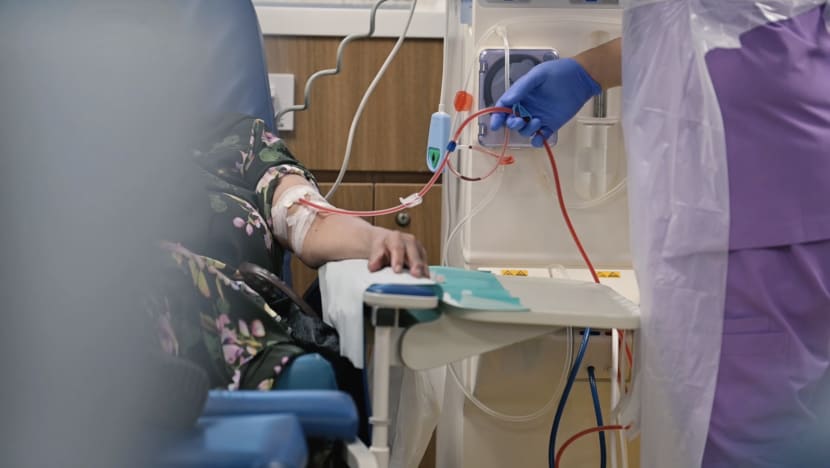Commentary: What this doctor wishes Singapore knew about kidney disease prevention
Kidney failure cases are on the rise in Singapore. This World Kidney Day, Tan Tock Seng Hospital’s Yeo See Cheng tells us what he wishes people knew about the debilitating condition.


This audio is generated by an AI tool.
SINGAPORE: Jane*, 49, was shocked when her doctor told her in 2022 that her condition had deteriorated into kidney failure and that she would soon require dialysis.
Two years earlier, she had been diagnosed with stage 4 chronic kidney disease, with her kidney function at less than 30 per cent. That diagnosis too was a surprise, as she had felt healthy, with no symptoms. She had limited insight into the implications of her illness and what she needed to do to prevent its progression.
She now wonders how she will be able to cope with dialysis, whether she can continue to work, and how her overall health will be affected in the future.
In another case, Lincoln* was diagnosed with diabetes five years ago. Urine screening for protein leakage at the same time also showed he had stage 1 chronic kidney disease.
With his doctor’s advice, he changed his dietary habits, took his medications regularly, and attended follow-ups with his general practitioner. He has lost some weight and monitored his blood glucose and blood pressure. To date, his kidney function remains within the normal range and the urine protein leakage resolved with treatment.
AN IMPENDING “KIDNEY TSUNAMI”
Thursday (Mar 14) is World Kidney Day. Unfortunately, Singapore has the second-highest prevalence rate for kidney failure globally, after Taiwan, according to the United States Renal Data System.
For patients with kidney failure, dialysis or a transplant are their only options. Over the past two decades, the number of dialysis patients in Singapore has more than doubled from 3,197 in 2002 to 8,878 patients in 2022. Six new patients are started on dialysis daily in Singapore.
About S$300 million is spent annually on dialysis treatment, according to The National Kidney Foundation, who warns of an impending “kidney tsunami”.
This is just the tip of the iceberg – about 500,000 people in Singapore suffer from kidney disease and are at higher risk of progressing towards kidney failure.
The alarming trend is driven mainly by the ageing population in Singapore, together with the high incidence of predisposing risk factors such as diabetes, high blood pressure and obesity. This is a result of increasing affluence and its associated lifestyle changes that have occurred over the past several decades.
Apart from its immediate health impact, kidney failure can also impose a heavy social cost to patients on a personal level and their caregivers. Dialysis is generally required three times a week, with each session lasting between three and five hours, making it difficult for many to maintain full-time employment.
Individuals suffering from kidney failure also tend to be quite ill – with health problems such as infections due to a weakened immune system, low red blood cell count, and extra fluid in the body causing high blood pressure, leg swelling and breathlessness – many requiring frequent hospitalisation. Some may even require a full-time caregiver due to the nature of this disease.
EARLY DETECTION THROUGH SCREENING
Importantly, kidney failure is largely preventable. The adverse outcomes of chronic kidney disease can be mitigated through early detection and effective treatment.
To effectively counter the rising rate of kidney failure, we require a more comprehensive approach that not only identifies barriers to early disease detection and facilitates the delivery of guideline-recommended therapies, but also incorporates educational and advocacy initiatives.
For example, under the Project Combat Kidney Disease, Tan Tock Seng Hospital has partnered with a network of general practitioners to better identify and improve the diagnosis of patients at risk of chronic kidney disease. This is done by providing timely updates in managing their chronic kidney disease, establishing a shared-care workflow, and a point-of-care urine test.

But still more needs to be done as it is estimated that over 90 per cent of people with chronic kidney disease are not aware of their condition, as they are frequently asymptomatic - hence the term “silent killer” coined for it.
Lifestyle modification is the cornerstone of managing chronic illnesses, including chronic kidney disease.
OUTSMARTING THE SILENT KILLER
Outsmarting the silent killer requires identifying the risk factors, one of which is a high dietary sodium consumption.
Singaporeans consume an average of 3,600 mg of sodium a day, which is almost double that of the World Health Organization’s recommended daily limit of less than 2,000mg of sodium.
This is mainly due to added salt, sauces and seasonings frequently used in our local diet, accounting for up to three-quarters of our dietary sodium intake, in contrast with the western diet where processed food is the main contributor.
Hence, there is a national push for low sodium or salt substitutes, especially as many Singaporeans tend to eat out often.
The government has over the years urged Singaporeans to reduce their sodium intake, and are also working with salt suppliers as well as food operators to replace regular salt used in cooking with lower-sodium alternatives.
Meanwhile, trials have shown that sodium-glucose co-transporter 2 inhibitors such as empagliflozin and dapagliflozin can reduce the risk of kidney disease progression by up to 37 per cent, when added to existing treatment.
These treatments are widely available in primary care and specialist clinics, with government subsidy available where applicable. However, the uptake of these treatments among eligible patients could be better. More awareness is needed that these treatments can protect the kidneys, beyond the usual control of underlying risk factors such as high blood pressure, diabetes, or excessive weight.
Through a comprehensive approach of early detection and effective interventions, it is hoped that kidney failure can be prevented, and that not too far from now, no one will need dialysis.
*Pseudonyms were used in this commentary.
Adjunct Assistant Professor Yeo See Cheng is Head and Senior Consultant, Department of Renal Medicine, Tan Tock Seng Hospital.



















